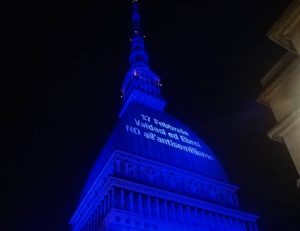NEWS In Turin, from the Mole to the streets to say no to antisemitism
Turin’s landmark, the Mole Antonelliana, was lit up in order to send out a message to the whole city. “17th February. Waldensians and Jews. No to antisemitism” is the slogan which was projected on the cupola of the Mole.
“It was a symbolic way to show solidarity between the two minorities and to send out a signal to all the Turinese: in order to fight intolerance, we need everyone to be present and committed”, says Dario Disegni, President of the Jewish Community of Turin, to Pagine Ebraiche. This appeal to the people has its highest point in last week initiative promoted by the Municipality with the aim of showing that Turin is at the forefront in the fight against poisonous antisemitism and any form of hatred.
“Antisemitism does not only concern Jews, but it’s a problem affecting the whole of society. And as such, we are expecting to see both individual citizens and social, political and cultural institutions taking to the streets tonight”, says Disegni. The Protestant Church is amongst the ones who immediately took action. “Our collaboration with Waldensians in Turin is innate, since our seats are 100 metres apart”, explains the President of the Jewish Community, “we have a common history of persecution, negation and obtaining of rights: in 1848 Jews obtained Emancipation thanks to king Charles Albert of Sardinia, and for the last few years we have been remembering this on 17th February – the day Waldensians were given emancipation in 1848 – as a joint achievement. We did not want to turn it into a commemoration or a celebration, but we wished to promote every year a reflection on civil rights which involves the whole population”.
Upon initiative of the Protestant Church, the focus of the reflection this year is antisemitism, underlines Disegni.
“In the past few weeks we have been witnessing heinous acts of antisemitism”, explained in an interview Patrizia Mathieu, President of the Consistory of the Waldensian Church of Turin. “I believe this phenomenon is taking place in a cultural context, in a very specific moment, and is partially caused by a lack of assumption of responsibility in Italy after the end of World War II. We left these traces, these marks of hatred, this underlying antisemitism which is now overflowing once again”.
Unlike Germany, “we buried our heads in the sand repeating ‘Italians, a good people’ and we did not think it over”, underlined Mathieu, explaining why they decided to promote a convention (which was held yesterday) on contemporary antisemitism. “We wanted to reflect on the current situation, and therefore we chose to discuss it with people who are dealing with current issues and today’s society, in order to define both the boundaries and the areas of intervention of this phenomenon in a more accurate way”.
Sociologist Betti Guetta of the CDEC’s Foundation Observatory on Antisemitism in Milan, historian Claudio Vercelli and Director of “La Stampa” Claudio Molinari were the protagonists of the meeting “No to antisemitism, an everlasting commitment”. “It was an extremely meaningful moment of analysis with a great turnout,” underlines Disegni, “the Waldensian Church was very crowded, which we hope is a positive sign. After the speeches of the lecturers, there was a musical moment featuring Piero Nissim’s performance”.
“We keep receiving subscriptions of institutions of any kind. We hope to see many people in the street and that organisations belonging to every field of society, i.e. politics, schools, trade unions, sports clubs, cultural associations, are there, in order to give out a signal of strong and educational commitment to the fight against antisemitism”. “We are witnessing a phenomenon which is being dangerously rekindled in Italy, in Europe and all over the world,” denounced Luca Maria Negro, President of the Federation of Evangelical Churches in Italy. “The figures are alarming. Acts of hatred against Jews are on the rise, starting from verbal aggressions, especially on the internet, graveyard and gravestone profanation, pulled up Stolpersteine, shameful writings on house walls”. Therefore, the Federation of Evangelical Churches is providing guidelines “Against antisemitism and hate culture” as a means of reflection and analysis at this Freedom Week, when we commemorate Emancipation.
*Translated by Sara Facelli and revised by Claudia Azzalini, both students at the Advanced School for Interpreting and Translation of Trieste University and interns at the newspaper office of the Union of the Italian Jewish Communities.

